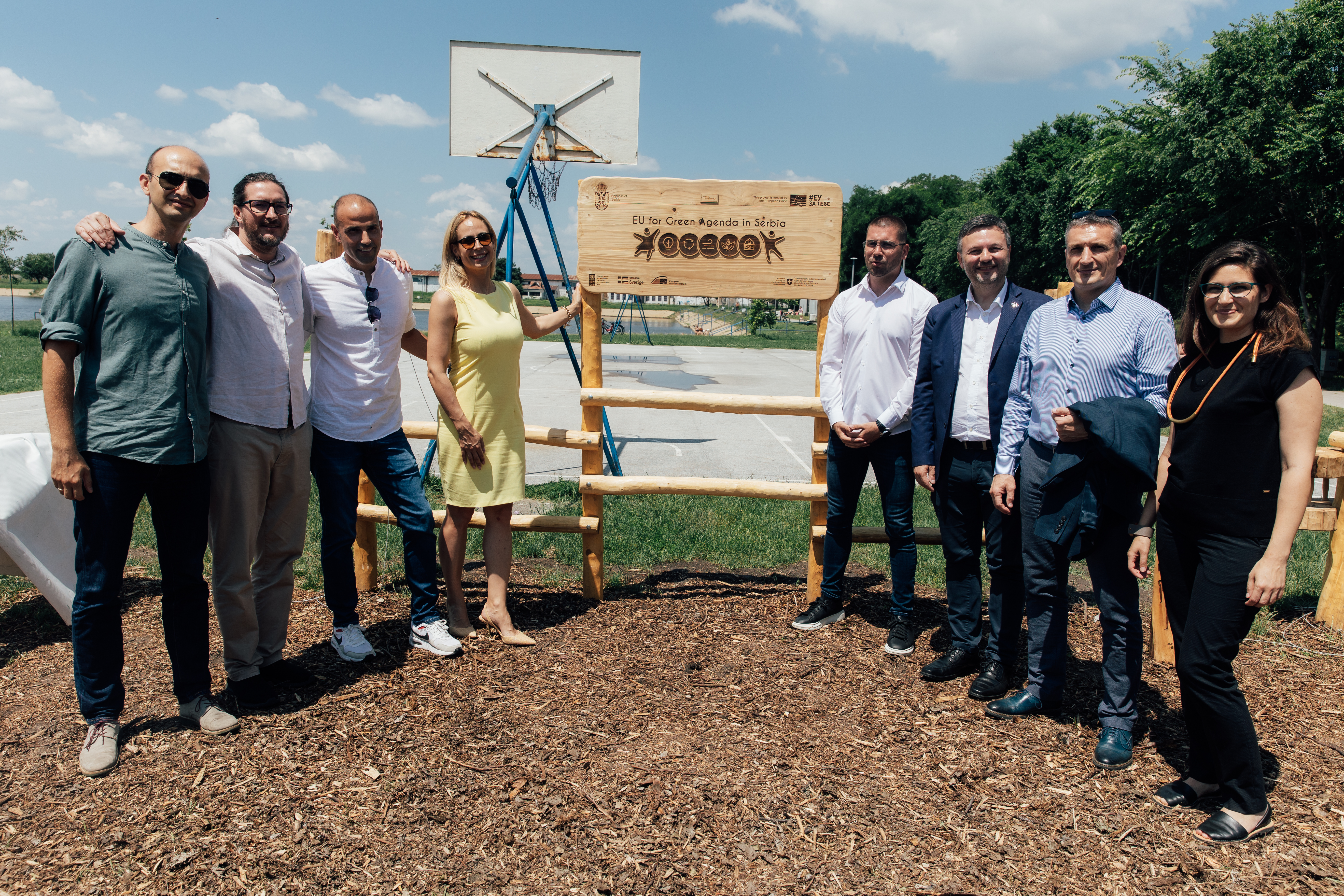An innovative solution for promoting sustainable exercise
The first Eco gym in Serbia opened in Vršac
June 27, 2023

Foto: Branko Kozlina
Vršac, June 27, 2023 - With the support of the European Union, the first Eco gym in Serbia was opened yesterday at the city lake in Vršac. This unique recreation area has 12 exercise machines made from wood that once floated down the Sava River. Thanks to this gym, the citizens of Vršac will be able to exercise both in nature and in harmony with it. The goal is to raise the awareness of recreationists in this way about the importance of reducing waste and preserving the environment.
The eco-gym was designed by sports professor Marko Ćirić and was realized together with the Center for the Promotion of Youth Entrepreneurship, thanks to the technical and financial support of the European Union within the "EU for Green Agenda in Serbia" initiative.
Antoine Avignon, the Chapter 27 Desk Officer at the EU Delegation to Serbia, pointed out that the people of Vršac benefit greatly from the Eco gym because they can exercise outdoors, next to the City Lake.
"At the EU, we believe that environmental protection comes with citizens' awareness, and this eco-gym is the first ever built in Serbia. It is a place where citizens can exercise, stay healthy, and practice a circular economy. Here, thanks to the creativity and hard work of Marko from Eko Gym, and the financial support from the EU for Green Agenda in Serbia with UNDP and Team Europe, the wood is picked up from rivers as debris and reused in fantastic outdoor sports equipment. Welcome to the first sustainable gym in Vršac!" said Avignon.
"When the water level is high, various waste and fallen trees float down the river, and the water carries them to the shores. I often stay on the Sava where I have a raft, and in that part, I regularly clean the river. On the other hand, I am oriented towards sports. As a coach, I wanted to use my sports knowledge and experience to create something that will contribute to the exercisers while raising their environmental awareness. Our goal is to inspire individuals to prioritize their own fitness as well as the well-being of our planet," explains Ćirić.
It takes two months to prepare the wood from the river for processing. After they collect it, it is dried and processed in a workshop in Belgrade, where exercise equipment is made. Nothing is thrown away, as the ground on which the gym is placed is made from the remains of wood produced during the construction of the equipment (mulch). In this way, by using wood from the river, the saving of natural wood resources is achieved, and environmental awareness of the importance of river cleaning is raised.
"This innovative idea shows how the principles of entrepreneurship and the circular economy can be combined to promote sustainable solutions in the field of sports. The Eco gym is not only to encourage physical activity but also to raise awareness of the importance of environmental protection and efficient use of resources. I invite all other innovators to apply to our Challenge Call for Proposals for innovative solutions for the green transition of the Serbian economy, which is open until the end of 2026," says Radovan Nikčević, Project Manager of the "EU for Green Agenda in Serbia".
Compared to the classic mechanical one, the Eco Gym offers greater opportunities for exercise with its combined equipment. It is intended for all ages, whether recreational or professional athletes because each of the devices has the possibility of adding a load of 50 kg. Also, each device has instructions on how to use it correctly. The authors of the Eco Gym plan to make creative playgrounds for children and parks for dogs from river wood in the same way.
The project "EU for Green Agenda in Serbia", with the technical and financial support of the European Union and in partnership with the Ministry of Environmental Protection, is implemented by UNDP in cooperation with the Embassy of Sweden and the European Investment Bank (EIB), with additional funding from the Governments of Sweden, Switzerland and Serbia.

Foto: Branko Kozlina

 Locations
Locations